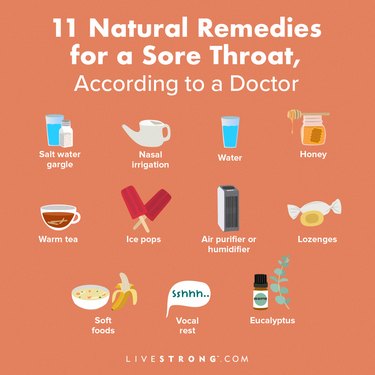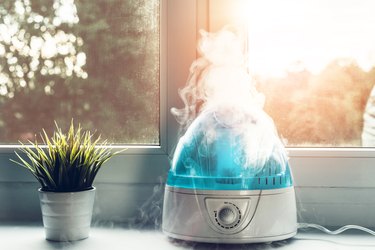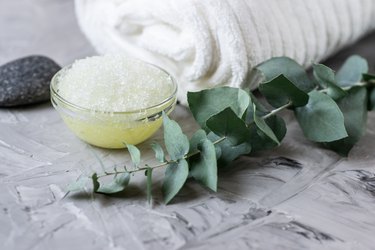
Getting a sore throat may bring on some anxious feelings these days, but you may not have to rush to the doctor just yet.
Turns out, a sore throat can also be caused by mild things like the common cold, seasonal allergies, acid reflux or even dry air.
Video of the Day
Video of the Day
No matter the cause, we can all agree they're uncomfortable and painful. Fortunately, there are some things you can do at home to help ease the ache, without medication or antibiotics.
If you're looking for sore throat relief, here are 11 natural sore throat remedies to try next time you get that unpleasant tickle.
Warning
If you have a severe sore throat, white patches on your throat and tonsils, mucus buildup, fever and nausea or vomiting, go to your doctor. You may have an infection like strep throat, which requires antibiotics.

1. Gargle With Salt Water
A salt water gargle should always be your first go-to for a sore throat Omid Mehdizadeh, MD, otolaryngologist (ENT) and laryngologist at Providence Saint John's Health Center in Santa Monica, California, tells LIVESTRONG.com.
"Salt water gargles are really wonderful for clearing out mucus, viruses and bacteria," Dr. Mehdizadeh says.
Gargling salt water is like a physical irrigation to help remove the pathogens that may be causing your sore, itchy throat, as well as a way to soothe inflammation, he says.
Indeed, a salt water gargle has been found to help reduce the viral load in people with upper respiratory infections, according to an August 2020 study in Public Health. In fact, the study found that using a salt water gargle within 48 hours of symptom onset reduced the average length of a viral illness by almost two days.
To make a salt water gargle, mix one cup of warm water with one-half teaspoon of salt. Take a sip, then gargle the mixture for four to five seconds before spitting it out. Repeat until the cup of salt water is gone.
You can use regular table salt, says Dr. Mehdizadeh, because the important aspect of the mixture is the salinity, which can clear debris and kill off bacteria and viruses. "You want the liquid to be a little cloudy, but not too salty that it's uncomfortable and will make you gag," he notes.
Both adults and children as young as 5 who are able to complete the gargle without swallowing the mixture can use this strategy.
Although gargling can be an effective way to deal with a sore throat, stick to salt water — Dr. Mehdizadeh does not recommend gargling with any type of antiseptic, such as hydrogen peroxide or beta iodine. Both are meant for topical use only and could actually inflame a sore throat even more.
2. Try Nasal Irrigation

Nasal irrigations are incredibly useful for helping to clear your respiratory tract, which can also relieve a painful neck and sore throat. They can be used as often as you need, provided you use the right concentration of solution.
Both actual seawater and commercial saline solutions are helpful in clearing nasal passages as well as promoting recovery of respiratory tract tissue, according to a November 2015 study in European Annals of Otorhinolaryngology, Head and Neck Diseases.
There are a few different types of nasal irrigation systems that can be used, such as a Neti Pot, NeilMed or Navage, but the key is that it has to use an irrigation solution and not just a humidifier spray.
When using any type of nasal irrigation, the most important thing to keep in mind is that you can never use tap water and only use the solution included with the nasal irrigation device. Tap water runs the risk of introducing potentially dangerous organisms, such as bacteria and amoebas, to the nasal passages.
The FDA explains that the organisms in tap water meant for drinking are killed off by stomach acid, but using it in a nasal irrigation system introduces them directly to your nasal passages, where they could be harmful to you.
3. Drink Water
If you have a sore throat, one of the first remedies you should reach for is good old-fashioned water, Dr. Mehdizadeh says.
Drinking enough water when you have a sore throat is especially important because the more water you drink, the more mucus and saliva you produce, which coats your throat and respiratory tract.
"Hydration is super important," Dr. Mehdizadeh adds. "I have patients who have sore throats because they are only drinking one [glass of] water in a day."
4. Have a Spoonful of Honey

A spoonful of honey might help a sore throat.
Honey is an effective home remedy for sore throat, Dr. Mehdizadeh says, because it acts as an antiseptic, which means it stops or slows the growth of germs.
In fact, adding honey to your sick-day arsenal may help improve symptoms of upper respiratory tract infections, according to an August 2020 systematic review and meta-analysis in BMJ Evidence-Based Medicine.
Honey can also coat the back of throat to provide some pain relief (even throat pain from throwing up). To use honey for a sore throat, you can either take a spoonful straight or mix it into a warm beverage. For example, drinking a cup of tea with honey can help sooth a sore throat at night before bed.
"You don't want to dilute it too much if your attempt is to coat the throat," Dr. Mehdizadeh says, so he recommends taking one teaspoon on its own. But honey in tea, for example, can also be soothing.
Garlic honey is another option, too, as garlic is often a natural cold remedy.
You can pump up the power of honey by combining it with the anti-inflammatory and antiseptic properties of ginger and garlic. A November 2017 study in the Journal of Contemporary Dental Practice showed that the combination of honey with garlic and ginger extract have an antimicrobial effect and can help treat a sore throat.
Warning
Do not give honey to infants under 1 year of age, as the ingredient is linked to a toxic illness called botulism in infants, per the CDC.
Can Cayenne Pepper Soothe a Sore Throat?
Some people like to combine cayenne pepper and honey, while others claim gargling cayenne water can offer relief.
Capsaicin, the active compound in cayenne that makes it spicy, is a known anti-inflammatory and antibacterial agent. There's not enough research on the spice to suggest whether it can calm a sore throat, but the ingredient has been used for treating ailments for hundreds of years.
Do not give cayenne to children, as it may lead to respiratory distress.
5. Sip Warm Tea
Drinking warm liquids like tea can help soothe a sore throat, according to the Mayo Clinic. Make sure to opt for caffeine-free tea, though, because caffeine can dehydrate you and potentially make your symptoms worse.
These teas are good options with soothing and anti-inflammatory properties, according to the Mayo Clinic and Penn Medicine:
- Chamomile tea
- Peppermint tea
- Clove tea
- Raspberry tea
- Slippery elm tea
- Licorice root tea
- Marshmallow root tea
- Echinacea tea
You also may have heard of oregano tea as a Mexican home remedy for sore throat. While oregano does have antimicrobial and anti-inflammatory properties, according to an April 2019 study in the International Journal of Food Sciences and Nutrition, there has not been any specific research around oregano tea for soothing throat soreness.
Does Lemon Help a Sore Throat?
Along with honey, lemon is a good addition to your tea when you have a sore throat because it can help break up mucus and is packed with vitamin C, which is a boon for your immune system, according to Penn Medicine.
6. Enjoy a Cold Treat
While tea and other warm liquids can help, sore throat relief can also happen at the opposite end of the spectrum, too.
Cold treats like ice pops or ice cream can relieve at least some of the discomfort of a sore throat by numbing the pain and helping to reduce inflammation and irritation, according to the American Academy of Family Physicians.
Does Orange Juice Help a Sore Throat?
Juice isn't the best choice for a sore throat. Specifically, you should avoid orange juice, grapefruit juice, lemonade or other acidic juices, according to Nemours KidsHealth, because these can irritate the throat.
If you're looking for a drink to help soothe a sore throat, try drinking warm liquids like tea or water with just a squeeze of lemon.
7. Try an Air Purifier or Humidifier

Dr. Mehdizadeh dubs both air purifiers and humidifiers as "wonderful" treatments for sore throats, especially in really dry environments and during the winter months.
Humidifiers are helpful because they moisten the air you breathe in, eliminating the dry air that can irritate and inflame your throat, per University of Florida Health.
However, there are some things to keep in mind when using a humidifier:
- Always use a cool mist humidifier
- Use it only in short bouts so it doesn't cause mildew to grow in your room
- Clean and dry the humidifier daily
- Use distilled water instead of tap
Additionally, air purifiers can reduce the number of indoor pollutants in the air, which can help decrease symptoms caused by allergies. For best results, you can put the air purifier by your bedside so it cleans the air while you sleep.
When choosing an indoor air cleaning method, the Environmental Protection Agency (EPA) recommends using a portable air cleaner for individual room air cleaning, as well as regularly changing and upgrading air filters as needed in your heating and cooling systems.
Additionally, avoid ozone-generating air cleaners and electronic air cleaners, which include ionizers, electrostatic precipitators, hydroxyl generators and UV light cleaners, per the University of Massachusetts Amherst. Both emit ozone, which is harmful to humans, although electronic air cleaners do emit less ozone than ozone-generating air cleaners.
8. Suck on Lozenges
Sometimes the best medicine for a sore throat and cough is the ingredients found in lozenges.
There are many over-the-counter (OTC) lozenges that can be used for sore throats, Dr. Mehdizadeh says. Personally, he recommends lozenges that have cepacol as the main ingredient, but he also notes that menthol lozenges, such as Halls cough drops, are also effective in soothing an inflamed throat. And of course, honey-based lozenges are also a popular choice.
However, there is a link between the overuse of menthol cough drops and chronic sore throat, according to the Journal of the American Board of Family Medicine, so you will want to stick to using cough drops for temporary relief only and call to your doctor if your sore throat continues for more than a few days.
9. Eat Soft Foods

Wondering what to eat with a sore throat? The American Cancer Society (ACS) recommends choosing foods that are soft, wet and easy to swallow and avoiding foods that are dry, crunchy, sugary, salty or spicy, as these can further irritate your throat.
These are also great foods to eat when you're sick, regardless of throat soreness.
The following foods are easy to eat and can be soothing for an achy throat, per the ACS:
- Shakes or smoothies
- Ice cream
- Hot soups or broths
- Mashed potatoes
- Macaroni and cheese
- Yogurt
- Eggs
- Oatmeal and other cooked cereals
10. Rest Your Voice
A sore throat can often be accompanied by laryngitis, voice hoarseness or a change in how your voice sounds, according to the Mayo Clinic. This is due to inflammation around your vocal cords when your body is fighting off a viral or bacterial infection.
The best thing you can do if you're facing both a sore throat and a lost voice is to practice vocal rest. Just like it sounds, vocal rest is simply giving your voice a rest. Try to avoid talking, or if you have to talk, whisper, as this strains your vocal cords less.
You also rest your voice while you sleep, so make sure you're getting plenty of shuteye each night (about 7 to 9 hours, per the CDC).
11. Employ Eucalyptus

If your sore throat is the result of a cold, you may find that using eucalyptus can help break up congestion and soothe your nasal passages. You could try a eucalyptus shower tablet to release the fumes in a hot shower, attach eucalyptus leaves to your shower head for some aromatherapy or diffuse eucalyptus oil.
According to a May 2015 paper in the Flavor and Fragrance Journal, eucalyptus essential oil can provide symptomatic relief for colds when inhaled. Eucalyptus essential oil in an ointment with a concentration of 1.3 percent V/m oil for adults and children over 12 can also be applied to your skin, but no more than three times per day and never to the face.
What About Hot Sauce for a Sore Throat?
You may have heard the suggestion of hot sauce to kill a sore throat at home, but Dr. Mehdizadeh says that's one at-home remedy you'll want to avoid.
While hot sauce does have capsaicin — the compound that gives chilis their heat factor — which has been linked to pain relief, hot sauce also has a lot of other ingredients and spices that cancel out that relief. In fact, he cautions that using hot sauce for a sore throat could actually end up inflaming and irritating it even more.
Is Cinnamon Good for a Sore Throat?
You may think that something warm and spicy like cinnamon would help clear your sinuses and soothe a sore throat, but there's limited information about its effectiveness.
There is some research to suggest that cinnamon has a small antibacterial effect, per a July 2018 review in Microbial Pathogenesis, but more evidence is needed to say it's a cure for sore throats.
People may try adding cinnamon to their tea or other warm beverages, but the spice may actually further irritate your throat when swallowing it. Instead, opt for tea flavors that help a sore throat — like peppermint, chamomile and lemon.
How to Prevent a Sore Throat
There are many things you can do to help prevent a sore throat and keep you healthy. These include the following, per the CDC and other sources:
- Wash your hands to prevent the spread of germs
- Avoid contact with people who are sick or wear a face mask to protect yourself from germs
- Don't smoke and stay away from secondhand smoke
- Use an air humidifier or purifier to prevent future sore throats, per the Mayo Clinic
- Treat your acid reflux: Use OTC antacids like Pepcid or Tums, and wait a few hours after eating to lie down. You should also avoid foods that trigger acid reflux, like spicy or fried foods, per the Cleveland Clinic.
- Treat your allergies: Take OTC allergy meds to get rid of your sore throat from seasonal allergies, per the Cleveland Clinic.
When to See a Doctor
A sore throat usually goes away in three to five days if you're using natural remedies.
But if your sore throat lingers beyond that, or comes with other symptoms like fever, chills, worsening throat pain or stomach upset, see your doctor. You may need antibiotics or other pain-relief medications to help you heal.
- BMJ Evidence-Based Medicine: “Effectiveness of Honey for Symptomatic Relief in Upper Respiratory Tract Infections: A Systematic Review and Meta-Analysis”
- Public Health: “Possible Beneficial Role of Throat Gargling in the Coronavirus Disease Pandemic”
- Journal of the American Board of Family Medicine: “Menthol Cough Drops: Cause for Concern?”
- University of Massachusetts Amherst: “Air Purifiers Fact Sheet”
- University of Florida Health: "Humidifiers and Health"
- Mayo Clinic: "Laryngitis"
- European Annals of Otorhinolaryngology, Head and Neck Diseases: “Nasal Irrigation: From Empiricism to Evidence-Based Medicine. A Review”
- FDA: "Is Rinsing Your Sinuses With Neti Pots Safe?"
- Flavor and Fragrance Journal: Essential oils in the Treatment of Respiratory Tract diseases Highlighting their Role in Bacterial Infections and Their Anti‐Inflammatory Action: A Review”
- Mayo Clinic: "Sore Throat"
- Penn Medicine: "6 At-Home Remedies to Ease Your Sore Throat"
- American Cancer Society: "Mouth pain, throat pain, or mouth sores"
- International Journal of Food Sciences and Nutrition: "Oregano (Origanum vulgare) extract for food preservation and improvement in gastrointestinal health"
- American Academy of Family Physicians: "Sore Throat"
- KidsHealth: "Strep Throat"
- CDC: "Botulism"
- CDC: "Sore Throat"
- Cleveland Clinic: "Laryngopharyngeal Reflux"
- Cleveland Clinic: "Relief When Allergies Give You a Sore Throat"
- Journal of Contemporary Dental Practice: "Antimicrobial Effect of Ginger, Garlic, Honey, and Lemon Extracts on Streptococcus mutans"
- Microbial Pathogenesis: "Antibacterial mechanisms of cinnamon and its constituents: A review"
- CDC: "How Much Sleep Do I Need?"
Is this an emergency? If you are experiencing serious medical symptoms, please see the National Library of Medicine’s list of signs you need emergency medical attention or call 911.